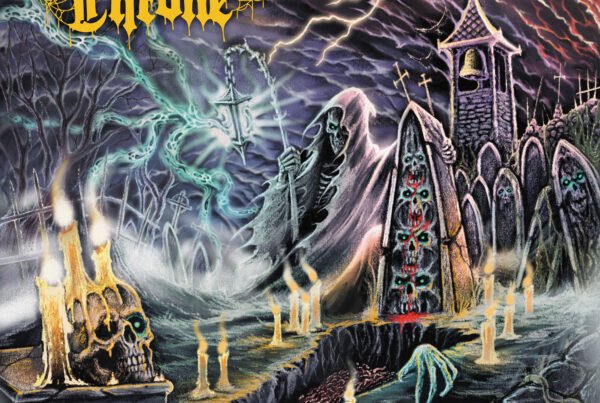Madi Diaz funnels her immense songwriting expertise into a intimate exploration of love with Weird Faith
Release date: February 9, 2024 | ANTI- Records | Facebook | Instagram | Twitter | TikTok | Bandcamp
Madi Diaz wastes no time getting to the point, so neither will I: Weird Faith is everything a heart-on-your-sleeve indie release could ever hope to be. Coming off a brief tour stint providing rhythm guitar and backing vocals for none other than Harry Styles, Diaz releases her 6th studio album, a culmination of the immense experience and mastery she’s gained since her debut release in 2007. Diaz certainly has an impressive resume in the industry, a fact that came as no surprise to me hearing the quality of this album for the first time. The honesty, directness, and succinct simplicity in expression, shows maturity and expert skill. Every track on the album is raw with emotion, yet the lyricism is so precise – she says exactly what she means and the music serves to deliver it transparently, without distracting or boring the listener for even a moment. It has this immutable feature of any great art or writing, that it feels effortless to consume mechanically, yet challenging emotionally.
Weird Faith was originally intended to be a tribute to love, yet it’s clear Diaz can’t help but lay out all the bits and pieces of her relationship with intimate truth, as a conglomeration of emotions. This isn’t a record that simply delights in the honeymoon phase, loathes the first fight, writhes through the breakup, then ascends in the recovery. There are plenty of albums like that, and plenty of them are great too, but with Weird Faith, Diaz breaks down the little pieces that aren’t often talked about – the anxiety of living up to the ex-partner, the guilt of hurting a loved one in the day-to-day, the hope that your emotional vulnerability isn’t misplaced, and the desperate confusion of equally loving and hating someone you’ve been together with long enough for that melting pot of emotions bubbles over and consumes you.
No relationship is perfect, and while it’s fun to ignore those first warning signs and bask in the glow of romantic fantasies, this isn’t what Diaz wants to tell us about. She wants to talk about the warning signs, the suppressed worries; and the good parts too, but without delusion or grandeur. It is so very intimate to go through someone’s inner thought processes, and I get the feeling this isn’t taken lightly. Diaz takes care of the listener, we get exactly what we can handle, and things remain comfortable through regular tension and release. The songwriting is simple enough to keep the focus on the lyrics, yet the melodies never feel boring or repetitive, with most choruses featuring just a single repetition of the melodic line, meaning even on a first listen you can almost start to sing along. It’s a wonderful thing too, because these lyrics and emotions deserve our full attention.
The first track that truly won me over remains my favourite on the record – “Get To Know Me”. It almost feels addressed to the listener, that as we approach the middle of the album and have gotten quite an intimate tour through the inner workings of Diaz’s emotions in her relationship, she now asks, ‘How well, how well do you wanna get to know me?’. The self-aware laundry list of insecurities and ‘negative’ traits is quite touching and I feel privileged that she has the experience in writing and the bravery to let us in this deeply. There’s also some clever tricks going on here musically, with the most ear-catching interval leaps timed for the more vulnerable and intense lyrics. The instrumentation is very bare and ballad-like during the verses, so we can focus on the natural twang and fry in the vocals. However, coming into the chorus the instrumentation becomes resolute, major and directly on the beat, releasing all the tension of the verse. Choices like this make this such a comfortable record to listen to, and I found it easy to absorb the emotive parts as intended without feeling overstimulated.
“For Months Now”, was another highlight for me, due again to the emotional strength of the track and some of the savvy tricks used to keep the intensity comfortable and evenly dosed. As with many of the songs on Weird Faith, this is a sparsely accompanied ballad with the focus dead centre on the vocal melody and texture. The chorus melody is quite simple and repeats over each four bars. It’s easy to remember, allowing us to focus on both the lyrics, and Diaz’s stunning upper register timbre. It seems deliberate that the melody is relatively tidy and predictable, to adjust for the ferocity of the lyrics. Considering these were initially intended to be love songs, how about this for a startling honest and brutal refrain, ‘I don’t love you like I used to/ I just don’t know how to tell you.’ But then we’re again treated to some emotional release, with the surprising Mumford & Sons-esque folk breakdown into the bridge/post-chorus. It’s a memorable and powerful moment that allows Diaz to really hammer home the guts of this track, ‘When I love you I hate you the most‘. She’s a master of her craft, and structural and instrumental choices like this feel deeply intentional and timely.
Not only does Diaz take care to allow emotional release within the songs, she also ends the album with an overwhelming release of all the pent up frustration and anxiety, “Obsessive Thoughts”. Having worked our way through all the ups and downs of this relationship, the outro finally invites us to scream into the pillow, empty lungs, and let it all go. The guitars are fuzzy and distorted here; texturally there’s little more complexity too, the vocals are heavily layered, in addition to the natural distortion of her voice, which she really lets off the leash in the chorus. It’s more of a rock feel than the rest of Weird Faith, with the verses driving assuredly forward, culminating in the absolute eruption that is the second chorus. It starts at 1:27 – if you listen to nothing else, please at least treat yourself to this brain massage, and take the deepest breath of your entire day. As the instrumentation crashes in unison over the multilayered harmony of the vocals, listen to that single soaring cry scream over it all. The way this top voice falters and shakes really just exemplifies the intimacy and entirety of expression in this moment, and the lyrics (‘It’s a lot/It’s all I got/Obsessive Thoughts’) match this sentiment, giving a sorry, not sorry for being so intense and raw. When she says ‘Is it hard to love me?/ Because I exist intensely?‘ I get the feeling that in the context of the rest of the album this is intended to mean, well, if it’s too much for you, you don’t deserve it.
Weird Faith is the peak (so far, fingers crossed) of a decorated career, experience and hard work, and I truly hope it is Madi Diaz’s proudest achievement. This is unadulterated, and crystal clear communication of deeply meaningful moments and feelings, both in the tight and direct lyricism, and the expert songwriting, where every choice serves to make the message fully felt yet manageable. This is what every artist should aspire to – to get their heart on the metaphorical paper without any opacity between them and the listener.






